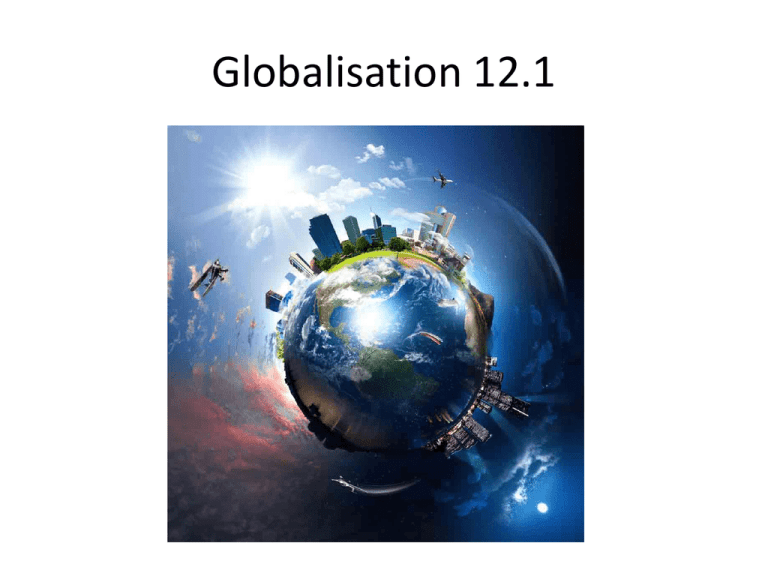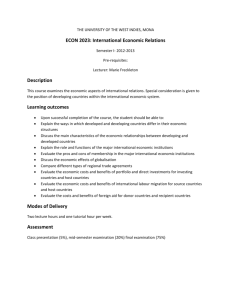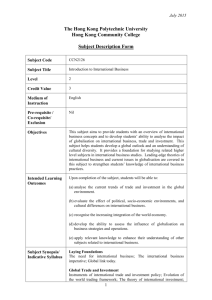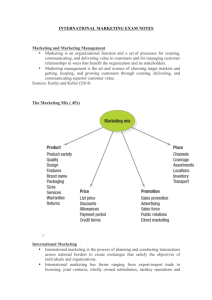- Canberra College Online
advertisement

Globalisation 12.1 Today…. • Nature and trends in globalisation: – Growth of global trade – Globalisation of production – Changes in the financial, labour and consumer markets – Role of government – Australia’s role Globalisation Recap • In short: • Globalisation refers to a trend towards a more integrated global economic system. • Globalisation is the movement across nations of trade, investment, technology, finance and labour. In the business world, globalisation refers to the process of businesses becoming transnational, and locating and conducting their operations in many countries. Globalisation also means change, as businesses work to deliver world-class products and services. 1. Growth of Global Trade 1945-1960 – United States domination of global trade • At the end of WWII, only the US had an economy able to produce goods on a large scale • Europe and Japan had suffered enormous damage to their industrial reasons • US transnational corporations dominated global business 1960-1980 – Japan and Europe re-emerge • By the end of the 1950s they had rebuilt their industries • European brands such as Nestle, Philips and Unilever emerged • Japanese brands such as Panasonic, Toyota and Sony emerged 1980 – present • The process of globalisation accelerated from the early 1980s. • Integration of the world’s markets has dramatically altered the nature and pattern of global trade • The US, EU and Japan still dominate the world economy, producing and consuming the majority of the world’s production of goods and services. 2. Globalisation of Production • The globalisation of production refers to the practice of many businesses to purchase their inputs from around the globe as well as the tendency to manufacture components in lowcost locations. Question: • What are the advantages to low cost global production? • What are the disadvantages? 3. Changes in Financial, Labour and Consumer Markets Financial Markets • Finance is now more mobile and flows relatively easily between countries • Controls on foreign exchange trading were phased out in the 1970s • By 1980, global foreign exchange trading was 10x the value of world trade • By 2005 it was 85x the value of world trade Labour Markets • Overall, the labour market has not been freed up to the same degree as other markets • Political barriers have made migration between countries more restricted • Even within the EU, only a small proportion of workers travel across national borders Two trends that have resulted in the movement of workers: • The movement of large numbers of temporary migrant workers in Europe and Asia. Filipino workers are a good example of this. • The growing demand for highly trained employees means that such people are increasingly mobile. Question: • What trends have resulted in the movement of workers internationally? Consumer Markets • Countries are achieving cost savings by specialising in products they can produce efficiently • This results in cheaper prices on the world market • Increased sales in existing markets • New consumer markets emerge in developing countries Question: • We often talk about ‘economies of scale’. What does this term mean? Economies of Scale “The cost advantage that arises with increased output of a product.” www.investopedia.com 4. Role of Government • Globalisation of companies enables some firms to take advantage of government policies in both their home country and in the country they visit. With great competition between nations to attract foreign investment, some governments are willing, for instance, to: • pay out generous subsidies (cash payments) to visiting multinationals • provide lower tax rates (or even tax holidays) and other concessions (e.g. cheap power, water, transport) to transnational businesses • ignore their concerns or dilute their environmental standards • protect visiting firms from import competition using tariffs. All these aspects can help to seduce overseas companies to relocate offshore in search of improved profits. For instance, some well-known multinational chemical, car and electronic companies have acted for these sorts of reasons. More specifically, a French multinational rubber product manufacturer did not like its government’s decision to introduce indicative economic planning some years back so it set up three plants overseas for every one factory it built at home. Question: • What are some ways that governments will try to attract foreign investment? 5. Australia’s Role? • Improved technologies and communications have changed consumer markets • With the advent of the Internet, Australian businesses may reach much larger markets and take advantage of economies of scale Question: • Can you think of a small Australian busniness that has benefitted from globalisation? Today we covered…. • Nature and trends in globalisation: – Growth of global trade – Globalisation of production – Changes in the financial, labour and consumer markets – Role of government – Australia’s role




